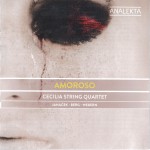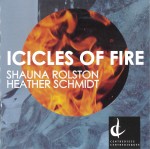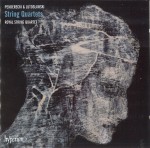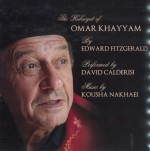During the 100th birthday celebrations for the “Dean of Canadian Composers” at Walter Hall last month, I had the pleasure of hearing the Cecilia String Quartet performing John Weinzweig’s String Quartet No.3, a rare treat indeed. I hope now that they have taken that wonderful, but sorely neglected, work into their repertoire we will have other occasions to hear it in the future. In the interim we can content ourselves with the second release in their 4-CD contract with Analekta. The Cecilia, named after the patron saint of music, is quartet-in-residence at the University of Toronto where they were founded in 2004. They have not spent the last decade on campus however and their world travels and accomplishments have included winning international string quartet competitions in Osaka in 2008, Bordeaux in 2010 and, perhaps most famously, First Prize at the Banff International String Quartet Competition that same year. Winners of a Galaxie Rising Stars Award in Canada, the CSQ have held residencies at the Austin Chamber Music Festival, San Diego State University, McGill University, QuartetFest at Wilfrid Laurier University, the Summer String Academy at Indiana University and were Quartet Fellows at the Glenn Gould School of the Royal Conservatory. In addition they have presented educational programs for elementary and high schools across Canada, the USA, Italy and France.
 But back to the matter at hand. Amoroso (AN 2 9984) includes classic European works from the first quarter of the 20th century: Leoš Janáček’s String Quartet No.1 (“The Kreutzer Sonata”), Alban Berg’s Lyric Suite and Anton Webern’s Langsamer Satz. The premise of the recording is that all of the works included reflect love stories in one way or another. Janáček based his quartet on the tragic novella by Leo Tolstoy which gives the work its subtitle. Berg, whose Lyric Suite was incidentally one of the seminal works that affected Weinzweig while studying at the Eastman School and led to his interest in serialism, which in turn would influence several generations of Canadian composers through his teaching, was evidently inspired by a long-lasting illicit love affair. An autograph copy of the score which came to light in 1977 includes many personal annotations to Berg’s beloved. Webern, primarily known for a small output of miniature gems that distill musical ideas to their crystalline essence, was actually quite prolific in his student days. The Langsamer Satz (slow movement), is one of about a hundred finished and sketched works from the time of his studies with Arnold Schoenberg which remained unpublished during his lifetime. The lushly romantic score, reminiscent of his teacher’s Verklärte Nacht, was written at a time when Webern was “head over heels” in love with his cousin Wilhelmine. This and the other love stories are well explained in Keith Horner’s very readable and detailed liner notes.
But back to the matter at hand. Amoroso (AN 2 9984) includes classic European works from the first quarter of the 20th century: Leoš Janáček’s String Quartet No.1 (“The Kreutzer Sonata”), Alban Berg’s Lyric Suite and Anton Webern’s Langsamer Satz. The premise of the recording is that all of the works included reflect love stories in one way or another. Janáček based his quartet on the tragic novella by Leo Tolstoy which gives the work its subtitle. Berg, whose Lyric Suite was incidentally one of the seminal works that affected Weinzweig while studying at the Eastman School and led to his interest in serialism, which in turn would influence several generations of Canadian composers through his teaching, was evidently inspired by a long-lasting illicit love affair. An autograph copy of the score which came to light in 1977 includes many personal annotations to Berg’s beloved. Webern, primarily known for a small output of miniature gems that distill musical ideas to their crystalline essence, was actually quite prolific in his student days. The Langsamer Satz (slow movement), is one of about a hundred finished and sketched works from the time of his studies with Arnold Schoenberg which remained unpublished during his lifetime. The lushly romantic score, reminiscent of his teacher’s Verklärte Nacht, was written at a time when Webern was “head over heels” in love with his cousin Wilhelmine. This and the other love stories are well explained in Keith Horner’s very readable and detailed liner notes.
The Cecilia String Quartet shine in these nuanced and moving performances which were recorded at the Banff Centre last December. Their first Analekta recording (AN 2 9892) featured works of 19th century giant Antonin Dvořák and this, their second, works of the early 20th century. Dare I hope that they will continue their march toward the present day and that a future disc may include the Weinzweig and perhaps the required works by Gilbert Amy and Ana Sokolović that were integral parts of their successes in Bordeaux and Banff?
 Icicles of Fire (Centrediscs CMCCD 18813) is one of the latest slew of releases from the Canadian Music Centre (discs of music by Ann Southam and T. Patrick Carrabré will be reviewed in next month’s WholeNote). It features music written for cellist Shauna Rolston by Heather Schmidt with the composer at the piano. There are numerous Banff connections with this disc as well. Rolston literally grew up at the Banff Centre where her parents Tom and Isobel were the teachers and directors from the mid-1960s. Calgary-born Schmidt, who is now based in Los Angeles, enjoyed numerous residencies at the Banff Centre over her developing years and composed the required work for the 1995 Banff International String Quartet Competition.
Icicles of Fire (Centrediscs CMCCD 18813) is one of the latest slew of releases from the Canadian Music Centre (discs of music by Ann Southam and T. Patrick Carrabré will be reviewed in next month’s WholeNote). It features music written for cellist Shauna Rolston by Heather Schmidt with the composer at the piano. There are numerous Banff connections with this disc as well. Rolston literally grew up at the Banff Centre where her parents Tom and Isobel were the teachers and directors from the mid-1960s. Calgary-born Schmidt, who is now based in Los Angeles, enjoyed numerous residencies at the Banff Centre over her developing years and composed the required work for the 1995 Banff International String Quartet Competition.
There are three works included here, presented in reverse chronological order. Synchronicity (2007) begins with a meditative chant-like introduction which is followed by a dramatic movement that begins with dense chords and tremolos and builds to a fiery conclusion replete with eerie animal-like squeals and glissandi from the cello. It was written for a documentary film by Paul Kimball about the collaboration between Rolston and Schmidt. Fantasy (2006) again begins in calm, this time in a minor tonality. After an extended meditation there is a lyrical interlude with tintinnabulations in the piano line overlaid by a gentle flowing cello melody that gradually gains momentum and intensity before returning to the darkly placid waters of the opening. Icicles of Fire (2003) is the most extended work presented here; at 21 minutes it is more than the length of the other two pieces combined. It was inspired by the composer’s participation in the governor general’s state visit to Finland and Iceland and the latter’s glacial landscapes and fiery volcanoes are reflected in the name. The first movement is quiet and delicate in its depiction of icicles while the second mixes soaring lyrical lines with the fiery molto perpetuo passages so well suited to Rolston’s style and temperament. There is obviously a strong bond between these two fine artists and Schmidt’s music is tailor-made to illustrate this.
Although just being released now, these performances were recorded at the Banff Centre in 2007 by the late Tom Rolston who died in 2010.
 There is also a nominal connection to Banff with the next disc as Poland’s Royal String Quartet placed third in the 2004 quartet competition there. But it is in the United Kingdom that the group has had most success with a nomination for the Royal Philharmonic Society chamber music award and an invitation to participate in the BBC’s New Generation Artists program. Founded in 1998 at the Fryderyk Chopin University of Music in Warsaw, they are currently quartet-in-residence at Queen’s University in Belfast. Although well versed in and well respected for their interpretations of the standard repertoire, the Royal Quartet specialize in music of their native Poland as attested by their three recordings on the Hyperion label. Following on the success of their Górecki and Szymanowski discs the latest CD (CDA67943) features the quartets of Penderecki and Lutosławski. The three quartets of Penderecki span nearly half a century and the changes in style are substantial. The first, dating from 1960, is from the same period as his seminal Threnody for the Victims of Hiroshima and bears the hallmarks of that experimental time, full of extended and “non-musical” techniques — bows are nowhere in evidence in the first two minutes of the piece, with the body of the instruments providing as much fodder as the strings. The second, from 1968, is still in the realm of the avant-garde, with abrasive passages alternating with eerie sounds of glissandi complemented by whistling from the musicians and extremely quiet, almost sub-audible sections.
There is also a nominal connection to Banff with the next disc as Poland’s Royal String Quartet placed third in the 2004 quartet competition there. But it is in the United Kingdom that the group has had most success with a nomination for the Royal Philharmonic Society chamber music award and an invitation to participate in the BBC’s New Generation Artists program. Founded in 1998 at the Fryderyk Chopin University of Music in Warsaw, they are currently quartet-in-residence at Queen’s University in Belfast. Although well versed in and well respected for their interpretations of the standard repertoire, the Royal Quartet specialize in music of their native Poland as attested by their three recordings on the Hyperion label. Following on the success of their Górecki and Szymanowski discs the latest CD (CDA67943) features the quartets of Penderecki and Lutosławski. The three quartets of Penderecki span nearly half a century and the changes in style are substantial. The first, dating from 1960, is from the same period as his seminal Threnody for the Victims of Hiroshima and bears the hallmarks of that experimental time, full of extended and “non-musical” techniques — bows are nowhere in evidence in the first two minutes of the piece, with the body of the instruments providing as much fodder as the strings. The second, from 1968, is still in the realm of the avant-garde, with abrasive passages alternating with eerie sounds of glissandi complemented by whistling from the musicians and extremely quiet, almost sub-audible sections.
There is a gap of 40 years before Penderecki’s next full foray into the quartet idiom. String Quartet No.3 bears the subtitle “Leaves of an unwritten diary” and reflects the post-romantic language that has permeated the composer’s work since the Polish Requiem completed in 1984. The opening passage is reminiscent of the Lacrimosa movement from that large-scale work, a motif which I have heard time and again in Penderecki’s later years. This is followed by a rhythmic section with close harmonies perhaps harkening back to the earlier quartets, but this is quickly replaced by a more lyrical sensibility that permeates most of the work. All three of the quartets are performed effortlessly and with conviction. This is obviously music close to the hearts of these fine young musicians. One omission that I find curious: in 1988 Penderecki wrote another brief piece for string quartet, Der Unterbrochene Gedanke (The Broken Thought), a miniature in homage to Schoenberg and the New Viennese School, which I am aware of from a 1994 recording by the Penderecki String Quartet. I think this would have provided a welcome bridge between the two early experimental works and the lyricism of the mature Penderecki.
The disc concludes with a masterful performance of one of the most important pieces of 20th century chamber music, Witold Lutosławski’s String Quartet from 1964. I look forward to hearing much more from the Royal String Quartet.
 The final disc I will mention is something completely different. Canadian actor David Calderisi has developed a wonderful entertainment based on The Rubaiyat of Omar Khayyam (okdac.net). The CD is in two parts. The first is Calderisi’s introduction to the work, the author (an 11th-century Persian mathematician) and the 19th-century “translator” Edward Fitzgerald who produced what went on to become the most widely published poem in the English language. The second is a stunning performance of 93 of the four-line poems (rubaiy’i) selected by Calderisi from the five collections authorized by Fitzgerald. Calderisi’s mellifluous voice and nuanced interpretation bring a wonderful life to these paeans to the author’s beloved and praises to his preferred libation: “Wine! Wine! Wine! — Red Wine!” The reading is interspersed with short and evocative musical interludes composed and performed on the kamancheh, a traditional Persian stringed instrument, by Kousha Nakhaei.
The final disc I will mention is something completely different. Canadian actor David Calderisi has developed a wonderful entertainment based on The Rubaiyat of Omar Khayyam (okdac.net). The CD is in two parts. The first is Calderisi’s introduction to the work, the author (an 11th-century Persian mathematician) and the 19th-century “translator” Edward Fitzgerald who produced what went on to become the most widely published poem in the English language. The second is a stunning performance of 93 of the four-line poems (rubaiy’i) selected by Calderisi from the five collections authorized by Fitzgerald. Calderisi’s mellifluous voice and nuanced interpretation bring a wonderful life to these paeans to the author’s beloved and praises to his preferred libation: “Wine! Wine! Wine! — Red Wine!” The reading is interspersed with short and evocative musical interludes composed and performed on the kamancheh, a traditional Persian stringed instrument, by Kousha Nakhaei.
In his introduction Calderisi states that he has found people react in one of three ways when asked if they know The Rubaiyat of Omar Khayyam: the first take offence at the very suggestion that they might not be well versed in the subject; the second admit to some knowledge if not an intimate acquaintance; and the third say “what?” I firmly fell into the second category before coming across this disc, but am pleased to say I feel I’ve moved a notch closer to knowledge now. Whatever your relationship to this 1000-year-old treasure, I think you will delight in Calderisi’s scholarship and presentation of one of the great works of “English” literature.
We welcome your feedback and invite submissions. CDs and comments should be sent to: The WholeNote, 503–720 Bathurst St., Toronto ON, M5S 2R4. We also encourage you to visit our website thewholenote.com where you can find added features including direct links to performers, composers, record labels and additional, expanded and archival reviews.
—David Olds, DISCoveries Editor
discoveries@thewholenote.com



